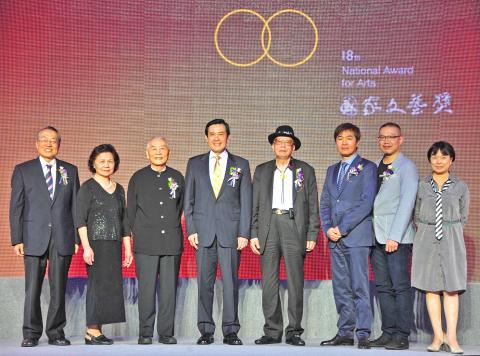The 18th National Award for Arts was presented to this year’s winners at a ceremony in Taipei yesterday.
The latest recipients of the award are film director Wang Hsiao-ti (王小棣), stage designer Austin Wang (王孟超), writer Wang Ting-chun (王鼎鈞), conductor Chien Wen-pin (簡文彬), architect Cheng Mei (陳邁) and abstract painter Chen Cheng-hsiung (陳正雄).
President Ma Ying-jeou (馬英九) and Minister of Culture Lung Ying-tai (龍應台) attended the ceremony, where Lung said the six artists have one thing in common — boldness.

Photo: Pan Shao-tang, Taipei Times
Acer founder Stan Shih (施振榮), chairman of the National Culture and Arts Foundation, which grants the award, said he hopes it not only recognizes the recipients’ artistic achievements, but passes on the spirit of their lives and creations.
Wang Ting-chun, 89, was recognized for his poetry, prose, novels and biographies that reflect his time and show his care for society, the foundation said.
It praised Wang Hsiao-ti for her achievements in film, television, animation, documentary and theater art, and for the care for society expressed in her works.
Austin Wang, best known for his work as stage designer for Cloud Gate Dance Theatre (雲門舞集), was hailed for his works that span traditional and modern theater and dance, and for his efforts in bringing Taiwanese theater to the world.
Chen was praised for his decades of dedication to abstract paintings and his in-depth study of Aboriginal artifacts in Taiwan and China.
The aesthetic value of Cheng’s architectural works was praised by the foundation, while it said that Chien won because of his multiple victories at international conducting competitions, for bringing the National Symphony Orchestra to a new artistic level and for promoting Eastern and Western music, art and cultural exchanges.
The six winners each received NT$1 million (US$33,076) and a trophy.
The National Award for Arts was established in 1997. Previous recipients include Oscar-winning director Ang Lee (李安), director Hou Hsiao-hsien (侯孝賢) and Cloud Gate’s founder and artistic director Lin Hwai-min (林懷民).

Chinese spouse and influencer Guan Guan’s (關關) residency permit has been revoked for repeatedly posting pro-China videos that threaten national security, the National Immigration Agency confirmed today. Guan Guan has said many controversial statements in her videos posted to Douyin (抖音), including “the red flag will soon be painted all over Taiwan” and “Taiwan is an inseparable part of China,” and expressing hope for expedited reunification. The agency last year received multiple reports alleging that Guan Guan had advocated for armed reunification. After verifying the reports, the agency last month issued a notice requiring her to appear and explain her actions. Guan

A preclearance service to facilitate entry for people traveling to select airports in Japan would be available from Thursday next week to Feb. 25 at Taiwan Taoyuan International Airport, Taoyuan International Airport Corp (TIAC) said on Tuesday. The service was first made available to Taiwanese travelers throughout the winter vacation of 2024 and during the Lunar New Year holiday. In addition to flights to the Japanese cities of Hakodate, Asahikawa, Akita, Sendai, Niigata, Okayama, Takamatsu, Kumamoto and Kagoshima, the service would be available to travelers to Kobe and Oita. The service can be accessed by passengers of 15 flight routes operated by

GIVE AND TAKE: Blood demand continues to rise each year, while fewer young donors are available due to the nation’s falling birthrate, a doctor said Blood donors can redeem points earned from donations to obtain limited edition Formosan black bear travel mugs, the Kaohsiung Blood Center said yesterday, as it announced a goal of stocking 20,000 units of blood prior to the Lunar New Year. The last month of the lunar year is National Blood Donation Month, when local centers seek to stockpile blood for use during the Lunar New Year holiday. The blood demand in southern Taiwan — including Tainan and Kaohsiung, as well as Chiayi, Pingtung, Penghu and Taitung counties — is about 2,000 units per day, the center said. The donation campaign aims to boost

The Central Weather Administration (CWA) said a magnitude 4.9 earthquake that struck off the coast of eastern Taiwan yesterday was an independent event and part of a stress-adjustment process. The earthquake occurred at 4:47pm, with its epicenter at sea about 45.4km south of Yilan County Hall at a depth of 5.9km, the CWA said. The quake's intensity, which gauges the actual effects of a temblor, was highest in several townships in Yilan and neighboring Hualien County, where it measured 4 on Taiwan's seven-tier intensity scale, the CWA said. Lin Po-yu (林柏佑), a division chief at the CWA's Seismological Center, told a news conference